Saturday Feb 14, 2026
Saturday Feb 14, 2026
Thursday, 26 January 2023 02:52 - - {{hitsCtrl.values.hits}}
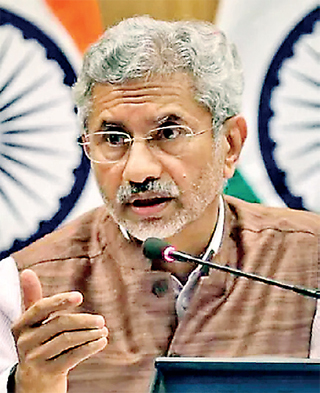
Indian Foreign Minister Dr. S. Jaishankar
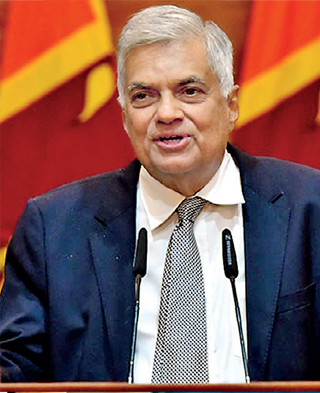
President Ranil Wickremesinghe
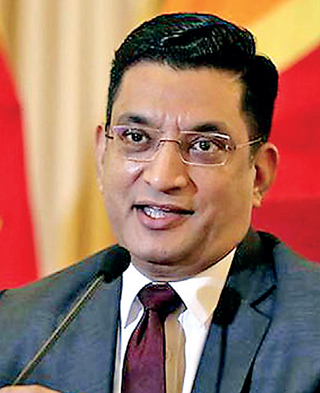
Foreign Minister Ali Sabry
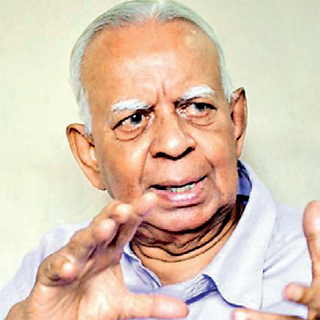
TNA Leader R. Sampanthan
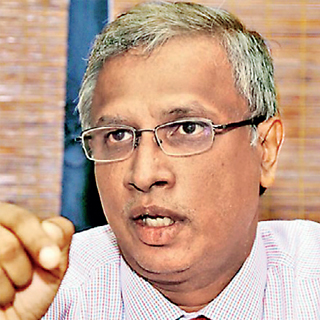
TNA Spokesperson M.A. Sumanthiran
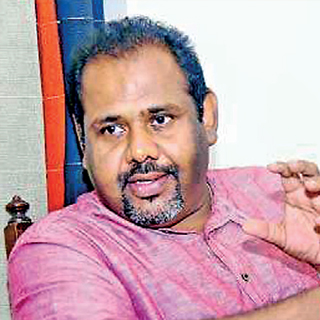
TNA MP Gajan Ponnambalam
|
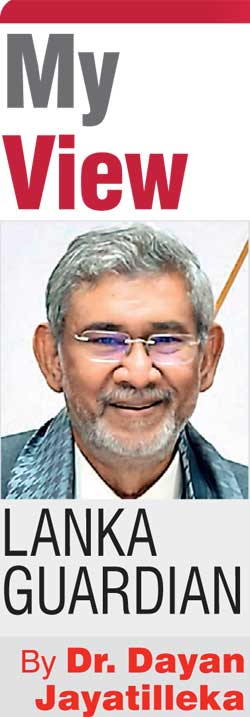
Economic revival certainly has a political prerequisite and a political economy core, but that is certainly not a new Constitution as JVP-JJB leader Anura Kumara Dissanayake proclaimed at his well-attended economic conclave, the equivalent of Gotabaya’s Shangri-La conclave of mid-2018. (New constitution must be at the core of SL’s economic revival: AKD | Daily FT)
With his line of thinking, we shall be waiting forever for economic recovery since successive administrations (1995-2019) have walked into a quagmire of contentious constitutional issues including devolution, proportional representation and abolition of the executive presidency while devolution remains intact.
Contrary to AKD, a new Constitution is not a pre-requisite, priority, foundation or core of economic recovery. Correct economic and social thinking and policies, combined with knowledge and experience are.
Having suffered from Gota’s, we cannot afford to experiment with Anura’s amateurism (‘red-Gota-ism’). In economics, only Sajith Premadasa and his SJB can hit the ground running.
Perilous postponement
Were the elections to be postponed, the rising expectations of the Opposition, ranging from the SJB to the JVP-JJB and FSP, and the vast number of candidates, would be dashed.
Instead of competing head-on at elections, the social democratic centrist SJB and the non-social democratic leftist JVP would engage in massive street protests in parallel.
The combination of rebellious youthful energies and social discontent that generated the tidal wave of the Aragalaya last year (2022), which would be channelled constructively into the democratic process and the grassroots institutions of local government through an election, thereby renewing, re-legitimising and re-energising the democratic system, would be kept outside to accumulate and explode in extra-systemic or anti-systemic direct action.
|
JVP Leader Anura Kumara Dissanayake
|
13A context, causation
Significantly, there was no joint communique as is usually the case at the conclusion of Indian Foreign Minister Dr. Jaishankar’s important visit.
In his remarks in the presence of Foreign Minister Sabry, with President Wickremesinghe oddly positioned in-between, Dr. Jaishankar, an old Sri Lanka hand from the late 1980s, expressed, “our [India’s] considered view that the full implementation of the 13th amendment and early conduct of provincial elections are critical…”
Now that India, a world power respected by the Americans and the Russians has stepped up to the plate and provided written assurances to the IMF on our behalf, both decency and prudence dictate that we treat the long-standing Indian view on this matter positively and promptly. We failed to do this after the war when President Mahinda Rajapaksa had pledged precisely this and a bit more (‘13 Plus’, i.e., a senate) to lock-in India’s support during the war and formally reiterated days after we won that war. However, there are reasons why the 13th amendment has never been fully implemented and such implementation is problematic.
The Sinhala ultranationalists oppose the 13th amendment for two reasons. It was the fruit of the Indo-Sri Lanka Accord which was signed in the wake of the Indian airdrop of 1987, i.e., external coercion and anyway they oppose any kind of devolution of power based on the interface of ethnicity and territory.
Verifiable facts reveal a different context and causation. The content of the 13th amendment—devolution of power to the provinces—had been under discussion and agreed upon between the Sri Lankan and Indian government for three years 1984-1987, before and without Indian military coercion.
In parallel, it had also been agreed upon without any Indian input, at the Political Parties Conference of June-July 1986 between the UNP government and the non-chauvinist democratic Left, led by Vijaya Kumaratunga, Dr. Colvin R. de Silva, Pieter Keuneman and Vasudeva Nanayakkara.
Had these agreements been implemented before the launch of Operation Liberation (‘Vadamaarachchi’) which triggered the Tamil Nadu backlash and Delhi’s intervention, the Indian state and its military would have been neutral or supportive of the Sri Lankan armed forces. This after all is what happened after the Accord was signed and the IPKF took on the LTTE in late 1987. It is also what happened during Sri Lanka’s final war when the pledge by Mahinda and his troika (Gotabaya, Basil and Lalith Weeratunga) to implement the 13th amendment secured the support we needed to neutralise Tamil Nadu and win the war.
As for the ‘principled’ i.e., political fundamentalist objection to territorial devolution as a solution to the Tamil Question and the denial that such a question actually exists as a distinct, unresolved political problem, the answer is that nowhere in the world does/will even the most moderate representatives of any national minority which comprises a majority in contiguous territories accept that assertion. Furthermore, it cannot be imposed by an ethnonational majority because the external backlash could impose an unaffordable cost. Unilateral imposition is impossible when there is an ethnic kin-state as cross-border neighbour of the given national minority. As Mervyn de Silva wrote: “in the information age, ethnicity walks on water”.
Mercifully, the majority of Sinhalese are not – or are no longer—ultranationalists. They have lived with the 13th amendment in the concrete form of the Provincial Councils since 1988. A civil war was fought in the South over provincial devolution and the radical xenophobic-ultranationalists (the JVP at the time) lost. With the Aragalaya, Sinhala chauvinism has receded or retreated while inter-ethnic solidarity is at a zenith.
Tamil take
The Tamil ultranationalists were opposed to or critical of the 13th amendment from 1987. The LTTE rejected it because Prabhakaran was unswervingly for Tamil Eelam. In September 1987 he was offered heavy preponderance in the interim administration that would govern the temporarily merged Northern and Eastern provinces—an offer that any liberation movement would have accepted. He rejected it.
This negativity towards the 13th amendment was contained in a letter from the Tamil United Liberation Front signed by Appapillai Amirthalingam to Prime Minister Rajiv Gandhi in 1987.
That negativity remains consistent, as evidenced by the TNA’s M.A. Sumanthiran’s remarks facing the TV news cameras on the evening of 20 January 2023 which began (in Sinhala) with “though we are opposed to the 13th amendment…”.
The only difference between radical Tamil nationalism (Gajan Ponnambalam) and moderate Tamil nationalism (M.A. Sumanthiran) is that the former rejects the 13th amendment as the start-line while the ITAK has reluctantly come around to accept it. The TNA or ITAK’s current stand is that under President Wickremesinghe, the full implementation of the 13th amendment can and must be the start, but they will continue to push for federalism as the sole solution.
While Tamil radical nationalists and moderate nationalists state that the 13th amendment is not the solution and federalism is, the moderate nationalists want to commence with a 13th amendment they are opposed to. It is illogical to want something one is opposed to, and logical for the other side to assume that anyone who commences on that footing will not want 13A to succeed and will push beyond to something other than what has been agreed to, once that has been ‘fully implemented’.
Most distressingly, the rejection of the 13th amendment is a priori. It precedes the testing out by hard work over time, of the amendment and the Provincial Council system as it stands. This was true when the EPRLF assumed office in the Northeastern Provincial Council in 1988 and Justice C.V. Wigneswaran assumed office as Chief Minister in 2013. The critique verging on rejection came as a preliminary declaration just as the respective administrations had assumed office.
In 1988 I was the youngest Minister (Mahinda Samarasinghe was older by months) in the Provincial Council system which came into existence after the Accord. Within months I quit the Cabinet of the North-East Provincial Council (NEPC), which, after an excellent meeting with newly elected President Premadasa in early 1989 had proceeded to alienate him and Minister Ranjan Wijeratne by placing newspaper advertisements referring to itself as the North-Eastern Provincial Government. As Premadasa insisted, in a unitary state there is only one government.
Dogmatic Tamil insistence on federalism as the sole solution stands in stark contrast with the political maturity of the Sinn Fein/IRA which worked the institutions set up by the Good Friday agreement though they fell far short of the aims for which the Provisional IRA fought an urban guerrilla war for 30 years.
On the occasion of the swearing-in of Chief Minister Wigneswaran (2013), I asked Sampanthan and Sumanthiran why what was good enough for the republican Catholic minority of Northern Ireland, i.e., devolution within a unitary state (which is no republic with proportional representation but a Constitutional monarchy with first-past-the-post elections and no written Constitution), was not good enough for the Tamil minority of Northern Sri Lanka. I have yet to hear an answer.
Tamil nationalists answer that they know the Sinhala state (and the Sinhalese) through long prior experience and that arrangements for devolution within a unitary state are inadequate because the State will inevitably refuse to share power or will override the power shared—thus, nothing short of federalism will suffice.
This reductionist essentialism brings to mind a joke related in philosopher Slavoj Zizek’s first book, ‘The Sublime Object of Ideology’ (1989), and dating back to President Jaruzelski’s martial law regime (1980-’83) in Poland.
Martial law empowered the military to shoot to kill anyone out on the streets 10 minutes after the 10 p.m. curfew. One day, at 10 minutes BEFORE the curfew, a soldier saw a pedestrian and shot him dead. When his superior officer sternly reprimanded him and demanded to know why he had done so when the curfew was still 10 minutes away and even then there was a 10-minute grace period, the soldier replied that he had recognised the pedestrian, knew where he lived and was aware that he couldn’t have made it home in the 10 minutes before the curfew or even the 20 minutes remaining before the curfew took hold at 10:10 p.m., and so he shot him.
That sums up the attitude of the Tamil parties towards the 13th amendment and the unitary state since 1987. This is the root of intractability.
Navigating intractability
Sinhala opinion which could be convinced to fully implement the 13th amendment if it was to be accepted as a final status agreement, cannot be convinced to do so as long as a determined push for federalism has already been announced as the endgame.
The current (post-Aragalaya) Sinhala consensus would permit reactivation of the 13th amendment in the form of freshly elected provincial councils, but hardly facilitate ‘full implementation’, as that would mean the transfer of powers which could be stepping stones to (ethno)federalism, which in the specific, unalterable geopolitical setting of Sri Lanka could prove centrifugal to the point of irredentism. It will therefore be rejected at a referendum.
No Sri Lankan administration which promises the full implementation of the 13th amendment would survive the beginnings of a push for federalism that issues from it.
No Sri Lankan political party that pledges to fully implement the 13th amendment while federalism still remains the political battle cry of the Tamil mainstream, will prevail in an electoral race.
A possible middle path would be to make full implementation of the 13th amendment conditional upon a renunciation of federalism or at least a moratorium on the issue.
If such conditionality is unacceptable then the commitment should be to the full but not immediate or fast-track implementation; i.e., to a gradual, incremental implementation of the more contentious provisions of the 13th amendment.
Devolution and dependency
Fully implementing the 13th amendment is one thing, but doing so while also giving India a foothold in our energy security in the same geographic area through an energy hub in Trincomalee which includes the oil tanks –which Foreign Minister Ali Sabry says was discussed with his visiting Indian counterpart—is something else altogether. If the 13th amendment is fully reactivated at the same time that India is granted a large economic footprint in Trincomalee, domestic geopolitics will change and this small island’s northeast will be transformed willy-nilly into an enclave of our great Northern neighbour. In his classic Arthashasthra, Indian sage Kautilya (Chanakya) hardly approved of giving such leverage to one’s immediate neighbour and cautioned strongly against it.
It is perfectly in order for India to make the proposal. Every state is entitled to and indeed mandated to advance its own interests. The problem is when the Sri Lankan state fails to be vigilant about its own core strategic interests.
Sri Lanka cannot rely on Ranil Wickremesinghe in the matter of safeguarding Trincomalee. As PM in 2001-2003 Ranil buried the US PACOM report which warned of the LTTE artillery buildup around the Trinco Harbour during his Ceasefire Agreement. The report was retrieved and presented to the Indian PM by President Chandrika Kumaratunga and her advisor Lakshman Kadirgamar.
The Trincomalee energy hub idea needs examination by a Parliamentary panel which summons top experts in the fields of energy and energy security. The Russian offer of two mini-nuclear plants should be considered since Bangladesh has already gone that route.
No democracy, no devolution
President J.R. Jayewardene’s excruciating difficulty in implementing the 13th amendment, an exercise which triggered a civil war, was because, having held a referendum in December 1982 and frozen the parliamentary balance for six years, he didn’t have the legitimacy of an elected parliament.
However, he was himself elected to parliament in 1977 and to the presidency in October 1982. President Ranil Wickremesinghe lacks the democratic legitimacy of his uncle President J.R. Jayewardene.
In 1988, the North-East Provincial Council election was in the last quarter of the year and had been preceded by Provincial Council elections in all other parts of the island. That deliberate sequencing by President Jayewardene released some of the pent-up pressure in the South and created a swathe of southern political stakeholders in the new, devolved sub-system.
Any attempt by President Wickremesinghe to fully implement the 13th amendment, without holding the local authorities election and other than through a freshly elected Parliament and Provincial Councils, will trigger an uprising.
i.Devolution plus energy/economic dependency will blow a hole in the unitary state, effectively subtracting part of it. There should be no devolution fused with dependency and eroded national sovereignty.
ii. There cannot be devolution to the northeastern periphery without ensuring the unity, territorial integrity and national sovereignty of the whole of the island.
iii. There can be no devolution anywhere on the island, without democracy everywhere on the island.
The issues of political devolution and energy dependence on India have to be de-linked, and subjected to complex, calibrated trade-offs.
Under a different, better leadership Sri Lanka will come out of its economic crisis just as with a change in leadership it prevailed in the war, but when it comes out of the economic coma, it should not discover that it has permanently lost control over a part of its territory that its armed forces sacrificed life and limb reclaiming from the separatists, and that the loss of control has actually rendered it dependent on its giant neighbour in the field of energy – on which everything else depends.